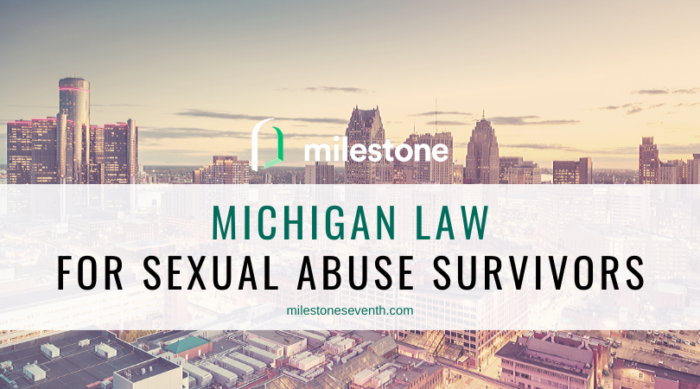This year, we saw unprecedented efforts to help protect survivors of sexual abuse. In New York, the Child Victims Act now allows people who were victimized as minors to seek justice against their abusers until age 55 in civil cases and age 28 for criminal cases. A new California law gives survivors until age 40 to file a civil suit against their attackers — a 14-year increase. New Jersey raised the age to 55. Arizona extended the time to take civil action to age 30. It has been emotional to see state after state giving people more time to come forward and opening the doors to victims who were previously barred by a statute of limitations.
Unfortunately, not all states have taken this kind of initiative. Michigan, for one, came up very short in revising its laws for sex abuse victims. In 2018, Act No. 183 offered a disappointingly small window to help survivors come forward and take action against their attackers. Essentially, the Act allows victims of “criminal sexual conduct” who were attacked by their physicians just 90 days to seek damages in a lawsuit.
The law says, in part:
(3) Regardless of any period of limitation under subsection (1) or sections 5805 or 5851, an individual who, while a minor, was the victim of criminal sexual conduct after December 31, 1996 but before 2 years before the effective date of the amendatory act that added this section may commence an action to recover damages sustained because of the criminal sexual conduct within 90 days after the effective date of the amendatory act that added this section if the person alleged to have committed the criminal sexual conduct was convicted of criminal sexual conduct against any person under section 520b of the Michigan penal code, 1931 PA 328, MCL 750.520b, and the defendant admitted either of the following:
(a) That the defendant was in a position of authority over the victim as the victim’s physician and used that authority to coerce the victim to submit.
(b) That the defendant engaged in purported medical treatment or examination of the victim in a manner that is, or for purposes that are, medically recognized as unethical or unacceptable.
Click here to read the full legislation.
It’s particularly unnerving to see such shortcomings in Michigan, considering it’s the center of the scandal involving sports doctor Larry Nassar. As a reminder, Nassar worked for Michigan State University and USA Gymnastics and assaulted more than 150 young women over a period of two decades. The women who have voiced their painful experiences in court have noted how MSU turned a blind eye to the abuse, even dismissing people who had previously tried to stand up for the victims.
Like many others, it is our hope that Michigan lawmakers continue to roll out better legislation that gives sexual abuse survivors the time they need to confront their attackers and see their day in court.


